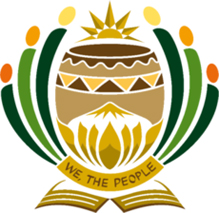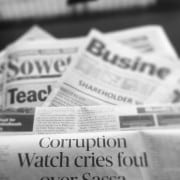|
Getting your Trinity Audio player ready...
|
 This Thursday, 23 August, is D-Day for 129 members of South Africa’s parliament to submit their annual declarations of interest, detailing their business dealings and property ownership. This follows a recent Business Day Live report that revealed almost a quarter of MPs had missed the initial 31 July cut-off date.
This Thursday, 23 August, is D-Day for 129 members of South Africa’s parliament to submit their annual declarations of interest, detailing their business dealings and property ownership. This follows a recent Business Day Live report that revealed almost a quarter of MPs had missed the initial 31 July cut-off date.
If there is a conflict of interest between an MP's business interests and a subject for discussion in parliament, this is made clear through the declaration, according to the article.
The joint ethics committee has agreed to give the offending MPs an extension until Thursday, but warned that those who had still not complied by that date would be punished according to the provisions of the code of conduct, which allows for fines and other punishments to be imposed.
This brings to light the question of whether financial disclosure can change a culture of corruption, as debated in a recent article by Shireen Mukadam of the Institute of Security Studies.
The following is an extract from Mukadam’s piece:
“It is not the president declaring assets that will change the country” was Nigerian President Goodluck Jonathan’s response on why he has not yet publicly declared his assets.
This was after Nigeria’s Socio-Economic Rights and Accountability Project on 26 June submitted a request for his asset declarations from May 2007 to 2012.
The project argues that President Jonathan’s refusal to publicly declare his assets shows the government’s “lack of political will to lead by example and to combat the endemic and grand corruption which has continued to have corrosive effects on the human rights … of millions of Nigerians”.
Is President Jonathan correct in stating that the declaration of financial interests and assets does not change the landscape of a country, or is there a role for this practice? In many parts of the world, this issue has become key in the fight against corruption.
In the Philippines, for example, an international precedent has been set regarding the non-fulfilment of disclosure requirements. In a landmark case on 29 May, over two-thirds of the Philippines Senate voted to remove Supreme Court Chief Justice Renato Corono for failing to disclose his interests, liabilities and net worth.
The implication of this decision means the country’s top judge is permanently barred from public office. According to Raymond Casiple, executive director of the Institute for Political and Electoral Reforms in Manila, the effect of this will be to enhance President Benigno Aquino’s anti-corruption campaign and his support.
In South Sudan, the world’s youngest country, financial disclosure has been a focal point in the fight against corruption. Last year, after accusations of grand-scale corruption in South Sudan, President Salva Kiir Mayardit issued a presidential decree that those in government and certain public servants were required to declare their wealth, including assets, liabilities and income. Non-governmental organisation workers are also required to declare their assets.
The South Sudan Anti-Corruption Commission announced in March this year that both President Kirr and Vice President Riek Machar had declared their personal interests, assets and liabilities and called for the cooperation of constitutional post holders and senior public servants before the deadline of 31 March.
Why all the emphasis on financial disclosure?
According to a recent publication by the World Bank and the UN Office on Drugs and Crime, Public Office, Private Interests: Accountability through Income and Asset Disclosure, international experience has taught that addressing corruption needs to be done on two simultaneous fronts: prevention and enforcement.
Income and asset disclosure systems are recognised as an anti-corruption tool that can potentially support both prevention and enforcement. According to this publication, there are three main benefits of financial disclosure: detecting and preventing corrupt behaviour and conflicts of interests; building integrity in public service; and enhancing public confidence in the integrity of government.
Article 8(5) of the UN Convention Against Corruption (2003) advocates that states parties should initiate systems that require public officials to make declarations regarding outside activities, employment, investments, assets and gifts or benefits from which a conflict of interest may result with respect to their functions as public officials.
At the continental level, Article 7 of the African Union Convention Against Corruption (2003) obliges states parties to require all public officials to declare their interests.
Declaration of interests and assets is one example of a preventative anti-corruption tool. However, perhaps even more important than the declaration of interests, is the monitoring and oversight thereof.
Public access to information vital in SA
In South Africa, weak oversight mechanisms mean that public access to information is critical. We rely on the public and the media to scrutinise financial declaration forms through the right of public access to information. The Who Owns What database, created by the Institute of Security Studies, is a mechanism to facilitate public access to elected officials’ interests and assets. Find out more about this in a Corruption Watch article posted earlier this year.
In order to promote the right of access to information, as set out by the Constitution in Section 32, all levels and branches of government should make their officials’ declarations available online. At the moment, parliament is the only institution in South Africa doing so. This would go a long way to closing the gap between the people and their elected representatives, and to demonstrate a willingness to put into practice commitment to transparency and accountability in South Africa.
Philosopher John Locke’s notion of the social contract comes to mind. Citizens elect officials to act as their representatives. Through this process of entrusting decision-making power into the hands of elected officials, these officials in turn have duties and responsibilities toward the populace. Key to this relationship is trust, which enables legitimacy. When breached through a violation of this social contract, public trust is eroded, which in turn undermines legitimacy.
Financial disclosure is admittedly not a panacea in the fight against corruption, but if used effectively is one step closer to revealing the opaque nature of the deals that go on behind closed doors.
As much as it is an instrument to deter corruption, its implementation and enforcement is also indicative of public officials’ commitment to transparency and accountability, which promotes public trust in government. Ultimately, accurate and comprehensive financial disclosure demonstrates that officials have nothing to hide and that their private business interests are not influencing officials’ public decisions. – Shireen Mukadam, researcher, governance and corruption division, Institute of Security Studies Cape Town






